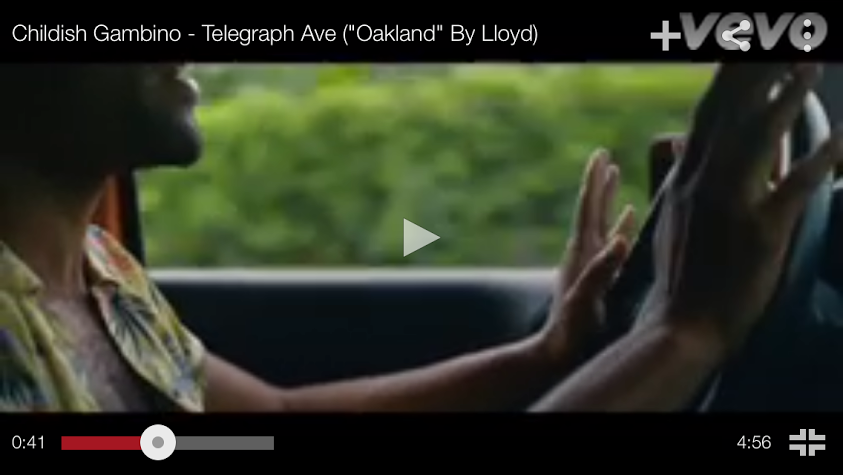Extended Playlist: Undiscovered Hip Hop
Childish Gambino (Donald Glover) jives along to his track ‘Telegraph Ave.’ in one of his trademark, multi-faceted video productions. (YouTube screenshot)
March 9, 2015
The late 20th and early 21st centuries have been characterized by the veritable revival of culture within the post-modern societies of the third world. As the values of Humanism and self-actualization rise to dominance in the minds and ambitions of everyday people, more and more tales of societal ascendance sweep the air waves. As society grows and grows in an almost perpetual progression art and music do as well. In the past the individual spheres of musicality and artistry have been unfailingly ‘whitewashed’, but over the last 60 years or so the genres of soul, R&B, and hip hop have risen to critical acclaim within multiple facets of culture; one could even argue that they were instrumental in the crafting of the new form of society we inhabit now. This new era of social progress and equality has seen an influx of minority artists rising to fame when only a few decades prior, these same artists would have been forced to play in race-exclusive clubs to segregated audiences. By utilizing the universal language of music and art, these individuals succeeded in creating things that transcend boundaries, erected by culture and genre.
Childish Gambino- Because the Internet
This highly innovative and unfailingly original record marked a new era in hip hop and music in general. Released with an accompanying 50 page screenplay meant to be read while listening to the album, ‘Because the Internet’ effectively explores the digital gap between real life and the digital existence our society has found such solace in over the last few years. Childish Gambino, the hip hop alter-ego of actor and comedian Donald Glover, has managed to craft something that can only be described as the first of its kind. Through the use of social media and technology ‘Because the Internet’ has managed to mutate into an immersive musical experience as the story itself becomes tangible on a myriad of levels. The music itself is infectiously fun and balances the hysterics of Glover/Gambino’s lines with irresistible hooks, inventive samples, and masterfully engineered beats. As with his first record ‘Camp’ released in 2012, ‘Because the Internet’ has served to propel Glover into another precipice of his career, earning him two Grammy nominations and positive reviews from multiple critics and his millions of fans.
Favorite tracks: III. Telegraph Ave. (“Oakland”), The Worst Guys (ft. Chance the Rapper)
Kendrick Lamar- Good Kid, M.A.A.D. City
Lamar’s first major label release chronicles his loss of childhood innocence on account of his growing up in Compton surrounded by drugs, crime, and gang violence. This record blends carefully nuanced R&B with hard-hitting, brutally honest verse into an already stark narrative, culminating in an exceedingly unique product. Rather than shamelessly glorifying the lavish over-indulgence talked about by so many of his peers, Lamar raps about his own experiences and his own convictions. While recording ‘Good Kid, M.A.A.D City’ he relocated to his old neighborhood, surrounding himself with friends and family in order to achieve the organic and genuine sound he hoped to convey in a cohesive way not possible in the plush studios of L.A. or New York. Lamar speaks about his familial troubles, his experience with substances in attempt to subdue reality, and his ongoing struggle to escape the influence of the city he spent his formative years in. This act of self-examination allows him to view his surroundings through a new light, leading to the album’s narrative style of describing the Compton area. The fear of gang violence, financial issues, and downtrodden residents are common reoccurrences in ‘the city.’ By utilizing this narrative style, the contrast between Lamar’s love and hate for the place of his youth begin to sink into the album as a whole, forging a common meaning within the myriad of topics. Regardless of race or station in life these themes are highly relatable and the sheer mutuality of the record’s content would have been enough to catapult it to platinum status; the fantastic production and tantalizing artistry of Kendrick himself are just added bonuses.
Favorite tracks: Poetic Justice, Swimming Pools
Frank Ocean- Channel Orange
Frank Ocean’s (Christopher Breaux) 2012 debut record, ‘Channel Orange’, led to the singer/song-writer’s manic rise to fame, earning countless accolades such as a 2013 Grammy award and the position of a household name to many. The sheer brilliance of ‘Channel Orange’ lies in the unconventional arrangements and the vast musical ability of Breaux himself. By fusing together a plethora of vastly different songs and drawing from a virtually endless array of influences such as EDM, pop, soul, jazz, and funk. The record breathes and progresses like a living organism, constantly shifting between moods and tones to illuminate Breaux’s inventive songwriting. The ever-shifting process of different sounds matches the wide array of topics explored in ‘Channel Orange’ like class, unrequited love, and the increasing appeal of moral decay. Breaux’s lyrical delivery is beautifully poetic and flows flawlessly with his sweeping vocals as he effortlessly glides between a conversational baritone to a stained glass falsetto. ‘Channel Orange’ broke down barriers in both musical and cultural facets as Breaux revealed his bisexuality to the general public, and the hip hop scene shocked the world by embracing his revelation and burying their homophobic past.
Favorite tracks: Bad Religion, Swim Good
Earl Sweatshirt- Doris
The 19 year old Odd Future affiliate’s debut record is bereft with all the trappings of his respective age group. Endearingly awkward and unassuming, Sweatshirt seems to thrive off his persona- one that is sure to inspire low expectations at first. His music reaches out and transfixes listener with an ease and intensity that would make veterans of the genre nod their heads with approval. Droning bass lines and gritty drum machines run rampant across the record as Sweatshirt’s minimalist style carves out room for his slow-burning verse to fill the edges of each track like smoke. If anything, the album feels more like the introspective efforts of the Indie ambient world-that is, until Earl’s pension for dark, brutally cool lyrical whims becomes apparent. Pinpointing the exact appeal of ‘Doris’ is not the easiest task, but the appeal is frequently there all the same, and if anything, this phenomenon bodes well for the fate of the music industry as a whole. For far too long the institutions of genre and specific sound demographics have all but segregated music the way our very own culture was segregated years prior. Now, records like ‘Doris’ can flourish in a motley myriad of listeners of all different ethnicities or stereotypes all joined together in their mutual appreciation, and confusion, pertaining to the album.
Favorite tracks: Hive, Chum




